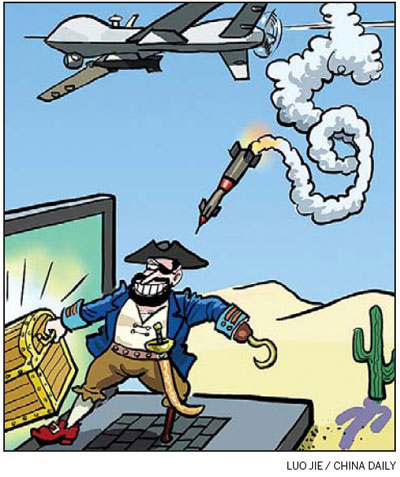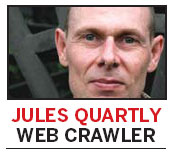Today's pirate is the entrepreneur of tomorrow

Before the Super Bowl on Sunday (a frigid Monday morning in Beijing), the FBI prepared for the TV event by closing down more than 300 Internet domains that streamed sports events and sold NFL merchandize. At the same time, the US Department of Justice was prosecuting by proxy the Megaupload boss Kim Dotcom. Meanwhile, the three entrepreneurs behind file-sharer Pirate Bay were denied appeals and will sweat it out behind bars for up to 10 months, in addition to paying millions of dollars in fines.
Their crimes were copyright infringement, and the sentence is commercial death.

Mr Dotcom is a fascinating figure, a German for whom the epithet "larger than life" is entirely appropriate. He and his minions had settled themselves in enviable luxury at a lavish villa complex in New Zealand, where they drove around in Mercs, Rolls-Royces and Maseratis with license plates boasting they were "MAFIA" or "CEO" and "GUILTY" - which was obviously a red rag to a bull.
Here, the buccaneers ran a file sharing and hosting site that was formerly the Web's 13th most popular, with 50 million visits daily, and that employed 150 people.
US prosecutors charge that Dotcom and his merry men had earned $175 million from pointing people to sites and servers where they could download PC games, music, films and software. Prosecutors neatly characterized the business model as a "mega conspiracy".
And the heat is being turned up even further by the US government, with a series of proposed regulations that have two things in common: acronyms and zero tolerance for copyright infringement worldwide. They are SOPA, PIPA, ACTA and now TPPA, which have all been rolled out to stop the pirates and benefit the copyright holders.
The owners of these file-sharing websites are operating anywhere but the US in an attempt to flout the country's copyright laws.
But they have discovered the tentacles of US law enforcement are long and strong. The Pirate Bay privateers were sent down in Sweden, while Kim Dotcom is behind bars in New Zealand.
The US is patrolling its Internet empire in full-offensive mode. It built the Web and wants to retain ownership. Furthermore, it depends on it for much of its economic well being, since manufacturing is no longer its strong suit.
And if you think China is safe, think again. Dotcom's business was Hong Kong based. We all know that file-sharing, illegal streaming and the rest go on here as much or maybe more than anywhere else. Considering its record-breaking Internet population and intense development, this should be no surprise.
And here is my point: These pirates really are the innovators. They are the future tech CEOs.
Sean Parker and Shawn Fanning got the P2P ball rolling with Napster in 1999. Parker's now worth $2.1 billion and is treated like a guru. He famously teamed up with Mark Zuckerberg to create Facebook, and as we know from Social Network and the payout he subsequently had to make, that was a copied idea, too. Fanning isn't doing badly, either.
News International's Rupert Murdoch insists Google's bosses are "pirate leaders", hosting his group's content for free. YouTube is predicated on hosting other people's works, and it wasn't long ago that Viacom was calling for its head.
Social networking sites like Digg, Delicious and even Twitter, which claim not to host other people's works (like Megaupload) actually do feature and link to them.
Much innovation is based on copying and making it better. The pirates of today are in fact the entrepreneurs of tomorrow. It's just a label that changes.
On the other hand, the US federal government's pursuit of these privateers and their products is fair game. After all, it is the government's job to protect its citizens and businesses, boosting them and putting the rest down. It's economic warfare out there. Or, business as usual.
But I have a feeling it will turn full circle before long, when the pirates become big business and even Kim Dotcom gets a green card and is part of the establishment.
Then, these soldiers of fortune will be the ones calling on the government to make a new generation of pirates walk the plank.
















